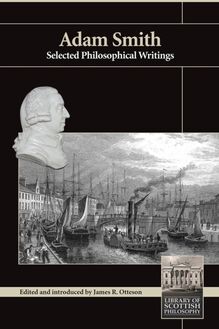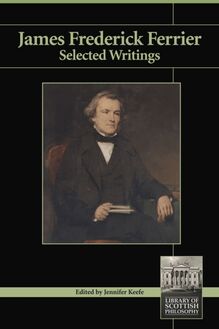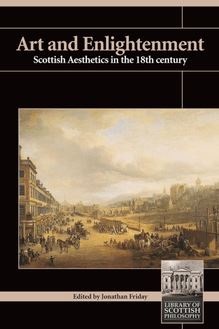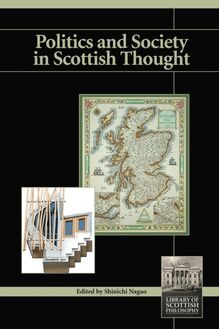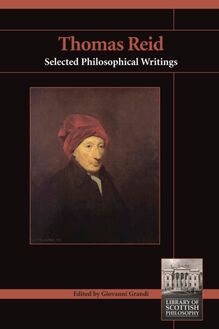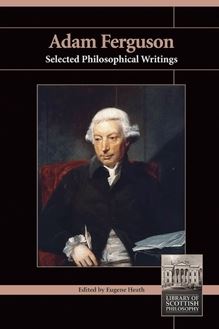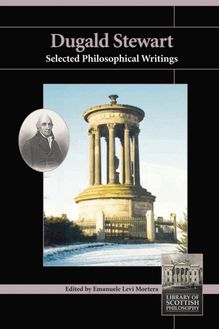Scottish Idealists , livre ebook
122
pages
English
Ebooks
2012
Vous pourrez modifier la taille du texte de cet ouvrage
Obtenez un accès à la bibliothèque pour le consulter en ligne En savoir plus
Découvre YouScribe en t'inscrivant gratuitement
Découvre YouScribe en t'inscrivant gratuitement
122
pages
English
Ebooks
2012
Vous pourrez modifier la taille du texte de cet ouvrage
Obtenez un accès à la bibliothèque pour le consulter en ligne En savoir plus
Publié par
Date de parution
15 octobre 2012
Nombre de lectures
3
EAN13
9781845404321
Langue
English
Publié par
Date de parution
15 octobre 2012
Nombre de lectures
3
EAN13
9781845404321
Langue
English
Title page
The Scottish Idealists
Selected Philosophical Writings
Edited and Introduced
by David Boucher
Copyright page
Copyright © David Boucher, 2004
The moral rights of the author have been asserted.
No part of any contribution may be reproduced in any form without permission, except for the quotation of brief passages in criticism and discussion.
Originally published in the UK by Imprint Academic
PO Box 200, Exeter EX5 5YX, UK
Originally published in the USA by Imprint Academic
Philosophy Documentation Center
PO Box 7147, Charlottesville, VA 22906-7147, USA
2012 digital version by Andrews UK Limited
www.andrewsuk.com
Series Editor’s Note
The principal purpose of volumes in this series is not to provide researchers with scholarly editions, but to make the writings of Scottish philosophers accessible to a new generation of modern readers. In accordance with this purpose, certain changes have been made to the original texts: Spelling and punctuation have been modernized. In some cases, the selected passages have been given new titles. Some original footnotes and references have not been included. Some extracts have been shortened from their original length. Quotations from Greek have been transliterated, and passages in foreign languages translated, or omitted altogether.
Care has been taken to ensure that in no instance do these amendments truncate the argument or alter the meaning intended by the original author. For readers who want to consult the original texts, full bibliographical details are provided for each extract.
The Library of Scottish Philosophy was launched at the Third International Reid Symposium on Scottish Philosophy in July 2004 with an initial six volumes. Attractively produced and competitively priced, these appeared just fifteen months after the original suggestion of such a series. This remarkable achievement owes a great deal to the work and commitment of the editors of the individual volumes, but it was only possible because of the energy and enthusiasm of the publisher, Keith Sutherland and the outstanding work of Jon M.H. Cameron, Editorial and Administrative Assistant to the Centre for the Study of Scottish Philosophy.
Acknowledgements
Grateful acknowledgement is made to the Carnegie Trust for the Universities of Scotland for generous financial support for the Library of Scottish Philosophy in general, and to Mr George Stevenson for a subvention for this volume in particular.
Acknowledgement is also made to the University of Aberdeen Special Libraries and Collections for permission to reproduce the engraving of the Edinburgh Faculty of Advocates from Modern Athens (1829).
Gordon Graham
Aberdeen, June 2004
Introduction
There was a time, not so long ago, when modern analytic philosophy dominated the Anglophone world, when Idealism as a philosophy was looked on with derision because of the alien character of its mode of analysis, heavily metaphysical, often impenetrable in its supposed mysticism, and all encompassing in its refusal to acknowledge dualisms and divisions of any kind. Everything had to be explained and understood in relation to broader and broader contexts, and ultimately in relation to experience, or the universe, as a whole. At a time when the unit of philosophical analysis had become smaller and smaller, and the clarification of concepts and the use of language almost anal-retentive, the grand theory of Idealism, thoroughly permeated as it was with religion and poetry, did not figure on the philosophical landscape. The possible exception is F.H. Bradley because, despite the fact that his logic and metaphysics were Idealist in character, his philosophical manner and rigour was more compatible with the analytic method.
The revival of interest in philosophical Idealism was at first historical. Melvin Richter’s The Politics of Conscience was an important milestone in this process, with the modest aim, not of reviving T.H. Green’s reputation, nor of endorsing the low esteem into which he had fallen, but instead of understanding him in his historical context. [1] Since then there has been a proliferation of interest, not only historically oriented, but also acknowledging and exploiting the Idealists’ contribution to developing a communitarian theory of the relation of the individual to society, and of formulating a widely accepted theory of rights in opposition to natural rights-grounded theories, namely one that rests upon social recognition as part of what it means to have a right, with their justification resting on the criterion of the common good. [2]
In the process of rehabilitating Idealism, both in historical and philosophical scholarship, the tendency has been to see it as a British, or more narrowly, as an English, phenomenon. It is not at all surprising since the histories of both Scotland and Wales have mostly been tangential or a mere adjunct to English and European history. What has been little noticed about British Idealism is the extent to which it was heavily dominated by Scotsmen, and the degree to which Scotsmen were the main exporters of it. There are a number of reasons why England has been seen as being at the centre of the importation of Hegelian Idealism into Britain. First, the figures who have since come to be represented as canonic in this loosely cohering group of Kantians and Hegelians are T.H. Green, Bernard Bosanquet, and F.H. Bradley, all Englishmen. Bosanquet is the only one of these three to have had a chair in Scotland (St. Andrews 1903-8). There were, nevertheless very strong links between T.H. Green and the philosophy students of Glasgow University. Edward Caird, the doyen of the Scottish Idealists, went to Balliol College, Oxford, in 1860 on a Snell Exhibition from Glasgow. There he struck-up an enduring friendship with T.H. Green. On returning to Glasgow Caird encouraged many of his students to study at Balliol as Snell exhibitioners, or Clark Fellows. Among those who took this route were W.P. Ker, taught by T.H. Green; John Henry Muirhead, taught by both Green and R.L. Nettleship; and David George Ritchie, taught by Green and Arnold Toynbee (of Toynbee Hall fame).
The second reason why the contribution of Scotland to Idealism has not been adequately acknowledged is that it was quite alien from the Scottish philosophy that preceded it, and what gave it a distinctive quality, a heavy emphasis upon poetry and literature, was not itself philosophical. Carlyle contributed significantly to making the British climate hospitable to Idealism. The empiricism of Dugald Stewart and his colleague Thomas Browne at Edinburgh University was in Carlyle’s view, as expressed in his Miscellaneous Essays , a mere preparation for philosophy, and in particular, a preparation for what was to be found in Kant. In his essay, ‘Signs of the Times’ he encapsulated in the phrase ‘the Mechanical Age’ his pejorative characterization of the main features of the age. [3] The problem in his view was that from Locke onwards metaphysics in Britain was both physical and mechanical, obsessed with the origins of consciousness and the genetic history of the content of the mind at the expense of exploring the mysteries of freedom and our relations to God, the universe, space and time. Carlyle gave the impression, not wholly justified, that he was ignorant of philosophical systems and dismissive of philosophical method. Even someone sympathetic to Carlyle could argue that ‘something more thoroughgoing than the literary methods of poetry and prophecy was called for to meet the intellectual demands of the new time’. [4] While many of his contemporaries viewed him as a philosopher, he has rarely been described so in the last century and a half.
A number of the Scottish Idealists were first and foremost men of literature, for example Mungo MacCallum who became professor of English literature at Sydney University and who was responsible for organizing Henry Jones’s visit to lecture on Idealism in Australia. [5] In addition, W.P. Ker became professor of Poetry at Oxford. One of those who were philosophers with literary frames of reference was, of course, Edward Caird, who famously wrote on matters literary, including Wordsworth and Carlyle. His protégé, Henry Jones’s first book was Browning as a Philosophical and Religious Teacher , and he also wrote on Walter Scott, Tennyson, Robert Browning and Shakespeare. [6]
A third reason why Scotland did not figure prominently in the mind of the person who invoked British Idealism was that one of its Scottish proponents, in tracing the history of Hegelianism in Britain, fails to differentiate between England and Scotland. [7] Hegel’s transformation of the philosophical vocabulary, far more radical than anything Kant or Fichte effected, made his passage into Anglo Saxon discourse doubly difficult. Understanding Hegel required at once the acquisition of the German language with a philosophical idiom whose weight it could barely sustain. Scotsmen proved themselves to be particularly brave in this respect, if not always wholly successful. James Frederick Ferrier (1808-64), for example, travelled to Germany in 1834 to acquaint himself with the growing tide of German philosophy. He expounded his ideas in opposition to Reid and Hamilton, but nevertheless thought his philosophy Scottish to the core. He maintains a position that, like Idealism, denies false dichotomies, such as the distinctions between subject and object, the real and the ideal, sensation and intellect. He recognized the necessity of a rational philosophy that could overcome the division that reason created. He ultimately claims as the culmination of his argument that: ‘All absolute existences are contingent except one ; in other words, th
